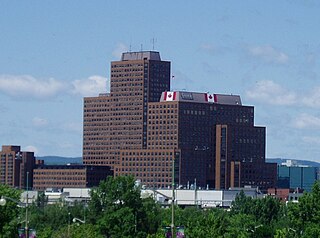Communications in Barbados refers to the telephony, internet, postal, radio, and television systems of Barbados. Barbados has long been an informational and communications centre in the Caribbean region. Electricity coverage throughout Barbados is good and reliable. Usage is high and provided by a service monopoly, Barbados Light & Power Company Ltd..

9-1-1, also written 911, is an emergency telephone number for the North American Numbering Plan (NANP), one of eight N11 codes. Like other emergency numbers around the world, this number is intended for use in emergency circumstances only, and using it for any other purpose is a crime in certain jurisdictions.
Enhanced 911, E-911 or E911 is a system used in North America to automatically provide the caller's location to 911 dispatchers. 911 is the universal emergency telephone number in the region. In the European Union, a similar system exists known as E112 and known as eCall when called by a vehicle.
Telemarketing is a method of direct marketing in which a salesperson solicits prospective customers to buy products or services, either over the phone or through a subsequent face to face or Web conferencing appointment scheduled during the call. Telemarketing can also include recorded sales pitches programmed to be played over the phone via automatic dialing.

A telephone directory, commonly called a telephone book, telephone address book, phone book, or the white/yellow pages, is a listing of telephone subscribers in a geographical area or subscribers to services provided by the organization that publishes the directory. Its purpose is to allow the telephone number of a subscriber identified by name and address to be found.

The General Services Administration (GSA) is an independent agency of the United States government established in 1949 to help manage and support the basic functioning of federal agencies. GSA supplies products and communications for U.S. government offices, provides transportation and office space to federal employees, and develops government-wide cost-minimizing policies and other management tasks.

An N11 code (N-one-one) is a three-digit telephone number used in abbreviated dialing in some telephone administrations of the North American Numbering Plan (NANP).

Universities Canada is an organization that represents Canada's colleges and universities. It is a non profit national organization that coordinates university policies, guidance and direction.

The Department of Canadian Heritage, or simply Canadian Heritage, is the department of the Government of Canada that has roles and responsibilities related to initiatives that promote and support "Canadian identity and values, cultural development, and heritage". To fulfill these tasks, the department coordinates a portfolio of several agencies and corporations that operate in a similar area of interest. While the roles and responsibilities of the Department of Canadian Heritage have remained relatively constant over the years, the department and composition of its portfolio remain in flux due to continuing structural changes.
Public Services and Procurement Canada (PSPC) is the department of the Government of Canada with responsibility for the government's internal servicing and administration. The Department is responsible for the procurement for other government departments and serves as the central purchasing agent, real property manager, treasurer, accountant, pay and pension administrator, integrity adviser and linguistic authority; it was recognized in 2018 as one of Canada's Best Diversity Employers. It is also the custodian of a large real estate portfolio and as well infrastructure such as bridges, dams and highways. While the stylized name of the department has changed, the legal name of the department remains the Department of Public Works and Government Services pursuant to section 3 of the Department of Public Works and Government Services Act S.C. 1996, c.
Cold calling is the solicitation of business from potential customers who have had no prior contact with the salesperson conducting the call. It is an attempt to convince potential customers to purchase either the salesperson's product or service. Generally, it is referred as an over-the-phone process, making it a source of telemarketing, but can also be done in-person by door-to-door salespeople. Though cold calling can be used as a legitimate business tool, scammers can use cold calling as well.

The Canadian Heritage Information Network (CHIN) is a Government of Canada-supported organization that provides a networked interface to Canada's heritage. CHIN is a Special Operating Agency within the Citizenship and Heritage sector of the Department of Canadian Heritage. It serves as a national centre of expertise to more than 1,600 museums and other member heritage institutions across Canada, and it aims to give access to Canada's heritage for both Canadians and a worldwide audience, by supporting the development, presentation and preservation of Canada's digital heritage. CHIN is based in Gatineau, in Quebec.
A reverse telephone directory is a collection of telephone numbers and associated customer details. However, unlike a standard telephone directory, where the user uses customer's details in order to retrieve the telephone number of that person or business, a reverse telephone directory allows users to search by a telephone service number in order to retrieve the customer details for that service.
Blue pages are a telephone directory listing of American and Canadian state agencies, government agencies, federal government and other official entities, along with specific offices, departments, or bureaus located wherein.

The Canadian Register of Historic Places, also known as Canada's Historic Places, is an online directory of historic sites in Canada which have been formally recognized for their heritage value by a federal, provincial, territorial and/or municipal authority.
A government database collects information for various reasons, including climate monitoring, securities law compliance, geological surveys, patent applications and grants, surveillance, national security, border control, law enforcement, public health, voter registration, vehicle registration, social security, and statistics.

Information Services Corporation (ISC) is a publicly traded Saskatchewan business corporation responsible for the development, management and administration of: registries – land titles, personal property, corporate and survey registries; geographic information; and access to government services for people and business.
GCTools is a suite of enterprise digital collaboration applications maintained by the Canadian Government. It consists of: